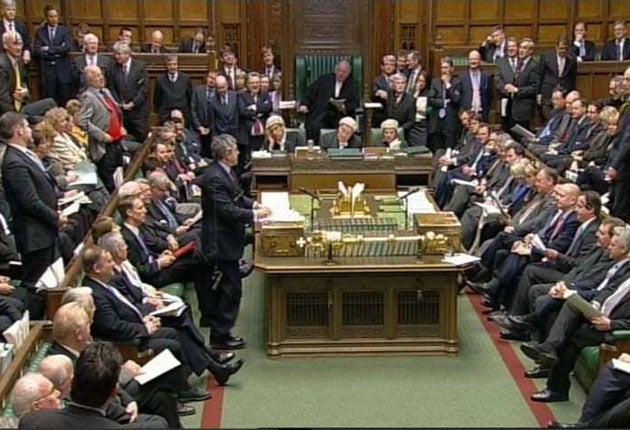Brown calls for scrapping of MPs' final-salary pensions

Your support helps us to tell the story
From reproductive rights to climate change to Big Tech, The Independent is on the ground when the story is developing. Whether it's investigating the financials of Elon Musk's pro-Trump PAC or producing our latest documentary, 'The A Word', which shines a light on the American women fighting for reproductive rights, we know how important it is to parse out the facts from the messaging.
At such a critical moment in US history, we need reporters on the ground. Your donation allows us to keep sending journalists to speak to both sides of the story.
The Independent is trusted by Americans across the entire political spectrum. And unlike many other quality news outlets, we choose not to lock Americans out of our reporting and analysis with paywalls. We believe quality journalism should be available to everyone, paid for by those who can afford it.
Your support makes all the difference.The end of the final- salary pension scheme enjoyed by MPs was in sight last night after Gordon Brown called for it to be scrapped.
The Prime Minister wrote to the Senior Salaries Review Body (SSRB), which is to conduct a major review of the scheme, asking it to consider a switch to a defined contribution scheme. The move paves the way for the present scheme to be closed to MPs who enter Parliament at the next election.
Mr Brown's intervention is bound to put pressure on the Government to launch a wider review of the final-salary pensions enjoyed by 4.5 million public-sector workers. Critics have warned that their cost will be an unsustainable burden for taxpayers in the long term. There have also been complaints of "pensions apartheid" after many private companies scrapped their final-salary schemes. Government sources insisted that the move on MPs' pensions did not herald a wider clampdown. They said it was about "a particular problem that needs to be addressed". MPs have one of the most generous final-salary schemes in Britain. It has been described as "cushy" and "gold-plated". They contribute either 6 or 10 per cent of their salary, which gives them a pension of either a 40th or a 60th of their salary for each year of service, up to a maximum of two-thirds of their £63,291-a-year salary.
Concern about the rising bill has forced MPs to accept the need for a review in principle. The Government says the time has now come for it. Some MPs may oppose any watering down of the scheme, saying it would create "two classes of MPs" and deter able people from standing for Parliament.
In his letter, Mr Brown said: "The Government is committed to providing public-service pension schemes that are affordable and sustainable in the long term, consistent with the principle of fairness for all taxpayers and between generations." He urged the SSRB chairman, Bill Cockburn, to consider the "full range" of options to reduce the taxpayers' contribution. These would include "increases in the pension age; changes in the provisions for retirement on the grounds of ill health; increases in MPs' contributions; changes in the accrual rate, changes in the maximum level of benefits that can be built up and the merits of defined-contribution structures".
Mr Brown's move will be seen as an attempt to allay the growing public criticism of politicians. The Government abandoned plans to block the disclosure of MPs' detailed expenses claims and faced further embarrassment when four Labour peers were accused of being prepared to accept "cash for amendments" to Bills going through the House of Lords.
David Cameron has already promised to end the MPs' final-salary pension scheme if he becomes prime minister. He has also hinted at a wider review of public-sector pensions but is reluctant to spell out detailed plans before the general election. "My vision over time is to move increasingly towards defined contribution rather than final-salary schemes," he said last November.
The Confederation of British Industry called in December for a rethink over the public-sector schemes, estimating the eventual cost at an "eye-watering" £1trn. Although the annual cost will rise from £2.3bn last year to £3.8bn next year, the Treasury insists the long-term burden is still affordable. It says measures have already been taken to limit costs over the long term, such as raising the retirement age for new members to 65.
Subscribe to Independent Premium to bookmark this article
Want to bookmark your favourite articles and stories to read or reference later? Start your Independent Premium subscription today.
Join our commenting forum
Join thought-provoking conversations, follow other Independent readers and see their replies
Comments